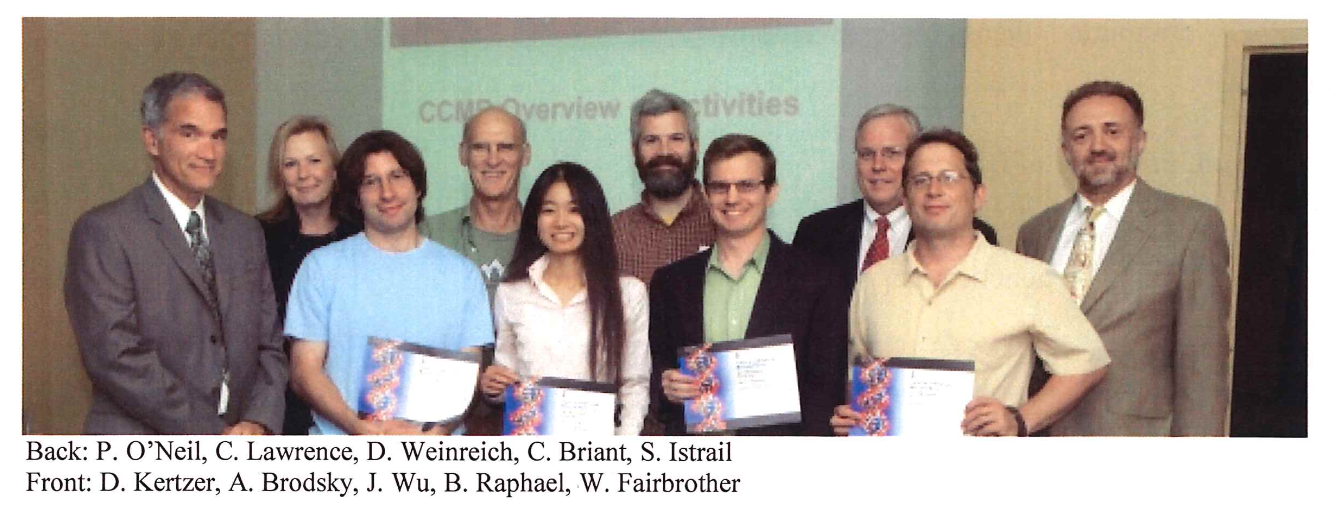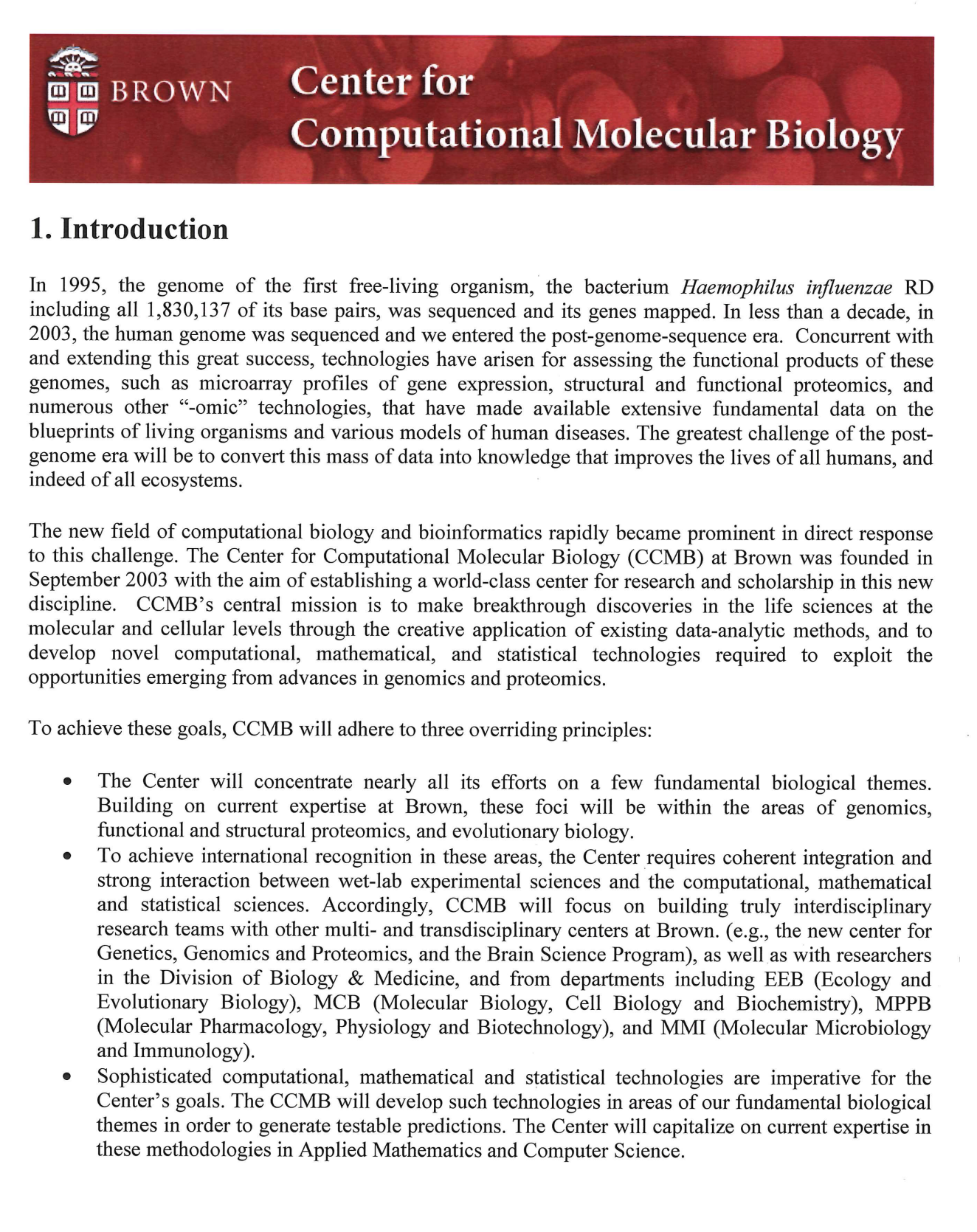CCMB's 20th Anniversary
History
The Center for Computational Molecular Biology was founded in September 2003 under the leadership of Sorin Istrail, James A. and Julie N. Brown Professor of Computational and Mathematical Sciences. The Center's mission was to establish a "world-class center for research and scholarship" in the area of computational biology and statistical sciences, and it has continued to do so over the last two decades. Key members of the original Executive Committee and pool of faculty still remain at Brown, teaching the next generation of scientists and discovering new advances in the fields of computational and biological sciences.
Original Faculty
In September 2003, CCMB's 11 core faculty members were housed in the Division of Biology and Medicine; Department of Ecology and Evolutionary Biology (now Ecology, Evolution, and Organismal Biology, (EEOB)); Department of Molecular Biology, Cell Biology, and Biochemistry (MCB); Department of Molecular Pharmacology, Physiology, and Biotechnology (MPPB); and Molecular Microbiology and Immunology (MMI).
Today, CCMB has expanded to 14 core faculty members from EEOB, Pathology and Laboratory Medicine, MCB, Biostatistics, Computer Science, and Bioinformatics, as well as 19 affiliated faculty members from other units on campus.

Many of CCMB's original faculty and executive committee members are still at Brown today:
Sorin Istrail
Professor Istrail is the Founding Director of the Center for Computational Molecular Biology. He is the James A. and Julie N. Brown Professor of Computational and Mathematical Sciences.
Charles "Chip" Lawrence
Professor Lawrence was Director of the CCMB from 2004-2006. He is a Professor of Applied Mathematics (Research) and Professor Emeritus of Applied Mathematics.
Daniel Weinreich
Professor Weinreich started with CCMB as an Assistant Professor of Biology and was a key member on the CCMB's first Executive Committee. Professor Weinreich took over as Interim Director of CCMB in July 2022 and is currently CCMB's Acting Director. He is the Royce Family Professor of Teaching Excellence in Biology, as well as Professor of Ecology, Evolution, and Organismal Biology.
Alexander Brodsky
Dr. Brodsky was an original faculty member of CCMB and an Assistant Professor of Medical Science. He is currently an Associate Professor of Pathology and Laboratory Medicine (Research) and has been with the Pathology department since 2014.
William Fairbrother
Professor Fairbrother began as an Assistant Professor of Biology at the start of CCMB and has since become a Professor of Biology. He is currently a faculty member in the Molecular Biology, Cell Biology, and Biochemistry Department. He also runs the Fairbrother Lab, a central part of the CCMB Ph.D. program.
Franco Preparata
Professor Preparata is the An Wang Professor Emeritus of Computer Science and is recognized as the "visionary founder" of CCMB.
David Rand
Professor Rand started in the CCMB as a Professor of Biology and has since become the Stephen T. Olney Professor of Natural History and Chair of the Department of Ecology, Evolution, and Organismal Biology. The Rand Lab also plays a large role in the CCMB Ph.D. program.
J. William Suggs
At CCMB's inception, William Suggs was an Associate Professor of Chemistry and Biochemistry. He is now Professor Emeritus of Chemistry.
Zhijin (Jean) Wu
Dr. Wu was the first female faculty member of CCMB as an Assistant Professor of Medical Science. She is now the Director of the Doctoral Program in Biostatistics and a Professor of Biostatistics.
Academic Programs
After the Center for Computational Molecular Biology was established in 2003, it began housing the Sc.B. concentration in Computational Biology which was created in 1996 to provide an interdisciplinary foundation for students interested in research methods that incorporated computer science, biology, mathematics and statistics, medical science, and more. This undergraduate concentration was designed in the Department of Computer Science, Division of Applied Mathematics, Division of Biology and Medicine, and the Department of Chemistry.
In 2009, CCMB proposed its Ph.D. program in Computational Molecular Biology, which was developed to educate future scientists to extract meaningful information about fundamental biomolecular processes in genomic sciences. The Ph.D. program had four main goals:
1) Build ties between departments at Brown and foster interdisciplinary research
2) Train students with a unique and robust curriculum that will set them apart when applying for positions in academia, industry, and government
3) Provide students with access to faculty mentors who are committed to the Center's goals and wish to create a diverse and inclusive community of students
4) Maintain a vigorous graduate program that will be symbiotic with the undergraduate concentration in computational biology and bridge the gap between students and faculty at all levels, ultimately enhancing research opportunities for undergraduate mentoring
CCMB Today
- CCMB now has two undergraduate concentrations: AB and Sc.B. Since 2001, there have been over 150 concentrators, 40 currently matriculating.
- The first CCMB Ph.D. graduate was Dr. Max Leiserson in April 2016, who is currently an Assistant Professor of Computer Science and a member of the Center for Bioinformatics and Computational Biology at the University of Maryland Institute for Advanced Computer Studies.
- The CCMB's Departmental Undergraduate Group (DUG) was established in 2017 by Isaac Kim, who is currently in the MD/Ph.D. program at Brown.
- As of August 2023, CCMB has 37 Ph.D. students matriculating and 19 Ph.D. alumni.
- CCMB also has postdoctoral researchers in the Bailey Lab (Department of Pathology and Laboratory Medicine), Larschan Lab (MCB), Huerta-Sanchez Lab (EEOB), Rand Lab (EEOB), and Ramachandran Lab (EEOB).
- As of 2020, CCMB has stimulated over $40 million in grants which include, but are not limited to, RO1s, R56s, an IDeA-CTR, an NSF CAREER, an NIH T32, and an NIH COBRE (Center of Biomedical Research Excellence) focused on the Computational Biology of Human Disease.
